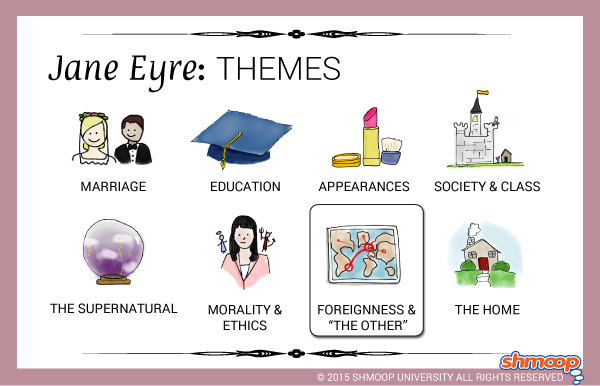 (Click the themes infographic to download.)
(Click the themes infographic to download.)
Foreignness and "The Other" are uber-complex themes in Jane Eyre. The novel depends heavily on the relationship between England, at the center, and a variety of other places and groups: colonial holdings, continental nations, missionary outposts, and even Asian stereotypes.
England and Englishness are both strengthened and threatened by each of these factors, and the ability to move between the foreign and the domestic is an opportunity for financial and personal gain—but also a chance for contamination, threats, fear, or prejudice. Even characters who seem to be at the very center of England and the very center of the novel can easily be made to seem foreign and out of place.
Questions About Foreignness and "The Other"
- There are a lot of different countries outside England that play important roles in Jane Eyre, especially France, India, and Jamaica. What is the novel’s tone or attitude toward each of these places? What do they represent or get stereotyped as representing?
- How can we, as twenty-first-century readers, think critically and productively about the racism and prejudice that are obvious in a nineteenth-century novel like Jane Eyre? Is it enough to say that historical context explains these attitudes, or do we need to delve deeper into them to understand how they work?
- How does Bertha’s Creole heritage relate to other aspects of her characterization?
- How would the novel be different if Bertha were a white Englishwoman or if Jane were Creole?
- Does Jane herself get "othered" in the context of Jane Eyre? In what settings does she seem like an outsider or a foreigner?
Chew on This
Bertha Mason embodies all the things that threaten the landed Victorian gentry: feminine sexuality, racial otherness, irrational behavior, and overseas wealth.
Jane’s outsider status at Gateshead is similar to Bertha’s outsider status at Thornfield.